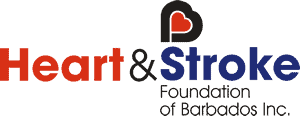Emergency Cardiac Care Programme (ECC)
Imagine being able to save the life of a loved one. In partnership with the American Heart Association (AHA), we make this possible for you! Through the ECC programme, four levels of training and certification are offered for beginners/laypersons, health care providers, and medical students.
All the Heart and Stroke Foundation’s training courses under this programme are conducted by volunteer instructors accredited by the American Heart Association (AHA) through the use of approved training manuals. A robust process is followed to ensure that instructors remain certified to conduct the training courses. Successful participants of the training are awarded AHA certificates and should be re-certified every two years.
The department operates under the oversight of a Medical Director, ECC, Dr. Anne-Marie Cruickshank.
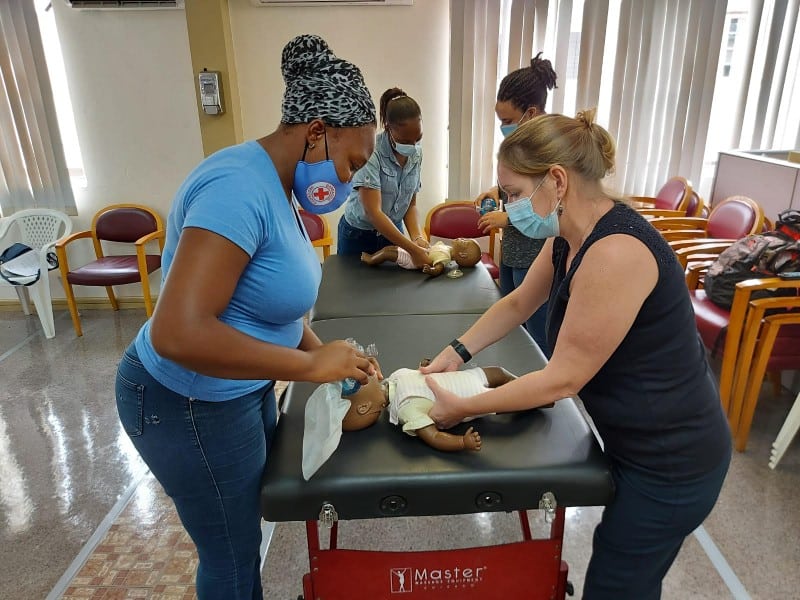
Professional Courses
The ECC Department of the Heart & Stroke Foundation currently offers four (4) professional courses. Look out for a new one coming soon!
Click on each course title below to view its details and register.
Dates: 1st & 3rd Wednesday of each month
Time: 8.30am to 3.30pm
Cost: $150.00 (inclusive of manual & E-certificate on completion)
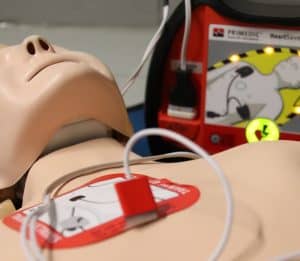 The Basic Life Support (BLS) course trains participants to save the lives of victims in cardiac arrest, through high quality cardiopulmonary resuscitation (CPR). This course trains participants to promptly recognize cardiac arrest, give high quality chest compressions, deliver appropriate ventilations, and provide early use of an automated external defibrillator (AED) as part of a team and individually. This course also teaches how to relieve choking.
The Basic Life Support (BLS) course trains participants to save the lives of victims in cardiac arrest, through high quality cardiopulmonary resuscitation (CPR). This course trains participants to promptly recognize cardiac arrest, give high quality chest compressions, deliver appropriate ventilations, and provide early use of an automated external defibrillator (AED) as part of a team and individually. This course also teaches how to relieve choking.
NEW: Blended Online Learning Option
2020 AHA Heartcode BLS Online Blended Learning
The online portion of BLS blended learning will prepare students for hands-on practice and testing of BLS skills.
The learner has a choice of completing a pre-hospital or in hospital contextualized track.
After completing the online portion, students will attend a structured, instructor-led hands-on session that focuses on meaningful skills practice, debriefing, team scenarios, discussions of local protocols and skills testing with a Heart & Stroke BLS instructor.
Who should complete the BLS course:
Target audience are: Healthcare professionals, Registered Nurses, Doctors and EMT
Learn to:
- Initiate the Chain of Survival
- Perform prompt, high quality CPR with C-A-B sequence (adult / child / infant)
- Initiate early use of an AED (adult / child / infant)
- Provide appropriate breathes
- Practice the minor BLS differences for children and infants
- Practice team CPR
No matter where an emergency may strike, having the right skills can save time, and save lives. Learn basic skills in a relaxed setting, through a lecture / video-based course, directed at exactly what you need.
Dates: Monday to Friday
Time: 8.30am to 3.00pm
Cost: $150.00 (inclusive of manual & E-certificate on completion)
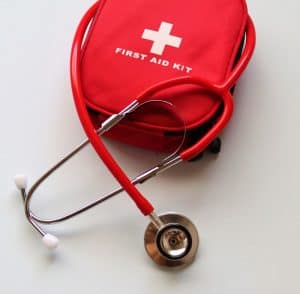
Heartsaver First Aid CPR AED is a one-day classroom, video-based, instructor-led course that teaches students critical skills needed to respond to and manage a first aid, choking or sudden cardiac arrest emergency in the first few minutes until emergency medical services (EMS) arrives. Students learn skills such as how to treat bleeding, sprains, broken bones, shock, and other first aid emergencies. This course also teaches adult CPR and AED.
New: Blended Online Learning Option
2020 AHA Heartsaver First Aid CPR AED Online
Heartsaver First Aid CPR AED Online offers the convenience of digital learning. The eLearning portion of the Heartsaver First Aid CPR AED blended learning course is designed to teach students the cognitive information needed for first aid, CPR, and AED training.
Upon completion of the online portion, students must complete a hands-on skills session with a Heart & Stroke Heartsaver Instructor.
Students must complete all optional modules prior to completing the course.
Who should complete the Heartsaver First Aid CPR AED course?
Target audience are: General Public, Dental Assistants, Security Officers etc.
Learn to:
- Identify warning signs and symptoms
- Deal with wounds and bleeding
- Fractures and spinal injuries
- Sudden illness
- Poisoning
- Bites and stings
- Environmental illness
- Perform CPR / AED skills
No matter where an emergency may strike, having the right skills can save time, and save lives. Learn basic skills in a relaxed setting, through a lecture / video-based course, directed at exactly what you need.
Dates: TBD
Time: 8.30am to 4.30pm
Cost: $550.00 (inclusive of manual & E-certificate on completion)
 The two-day ACLS Provider Course provides the knowledge and skills needed to evaluate and manage the first 10 minutes of an adult ventricular fibrillation/ventricular tachycardia (VF/VT) arrest.
The two-day ACLS Provider Course provides the knowledge and skills needed to evaluate and manage the first 10 minutes of an adult ventricular fibrillation/ventricular tachycardia (VF/VT) arrest.
Who should complete this course?
Target audience are: Registered Nurses and Doctors
Learn to:
Providers are expected to learn to manage 10 core ACLS cases: a respiratory emergency, four types of cardiac arrest (simple VF/VT, complex VF/VT, PEA and asystole), four types of pre-arrest emergencies (bradycardia, stable tachycardia, unstable tachycardia and acute coronary syndromes) and stroke.
- Recognition, intervention, and prevention of peri arrest conditions such as
- Lethal arrythmias
- Myocardial Infarction
- Stroke and its complications
- Advanced airway management
- Arrhythmia recognition
- Defibrillation and Cardioversion
- Cardiac Pharmacology
Prerequisites: Current certification of Basic Life Support (BLS) is required for entry.
If needed the Heart & Stroke Foundation of Barbados will arrange for certification or re-certification in BLS, upon registration for an Advanced Cardiac Life Support Course
Advance your skills with ACLS.
Dates: Monday to Friday
Time: 8.30am to 3.00pm
Cost: $150.00 (inclusive of manual & E-certificate on completion)
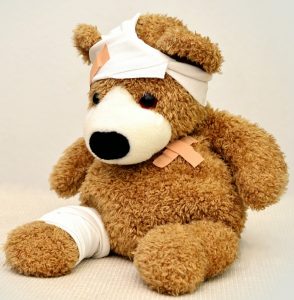 The Heartsaver Paediatric First Aid course is designed to meet the regulatory and credentialed training requirements for childcare workers. This course teaches basic first aid, CPR, and AED skills for children such as:
The Heartsaver Paediatric First Aid course is designed to meet the regulatory and credentialed training requirements for childcare workers. This course teaches basic first aid, CPR, and AED skills for children such as:
- What to do when a child or infant has a breathing problem
- Giving compressions and breaths to an infant or child
- Stopping bleeding that can be seen
Who should complete this course?
Target audience are: Nannies, Parents, Nursery Workers, School Teachers and Youth and Child Association Workers
Learn to:
- First Aid Basics
- Medical Emergencies
- Injury Emergencies
- Environmental Emergencies
- Optional Paediatric First Aid Modules Are:
- Paediatric first aid topics (eye injuries; fever; suspected abuse; animal bites, tick and marine ,bites and stings)
- CPR and AED use.
- Asthma care training for child care providers
No matter where an emergency may strike, having the right skills can save time, and save lives. Learn basic skills in a relaxed setting, through a lecture / video-based course, directed at exactly what you need.
 Designed for healthcare providers and others who might encounter paediatric emergency situations during their work. Upon successful completion of this course, students will be able to:
Designed for healthcare providers and others who might encounter paediatric emergency situations during their work. Upon successful completion of this course, students will be able to:
- Emergency Cardiovascular Care (ECC)
- Evaluate a seriously ill or injured child by using the paediatric systematic approach
- Apply effective team dynamics
- Demonstrate initial stabilization of a seriously ill or injured child, including a child with cardiac arrest, respiratory distress, or shock
- Vital Signs in Children
- BLS Healthcare Provider Paediatric Cardiac Arrest Algorithm for the Single Rescuer
- BLS Healthcare Provider Paediatric Cardiac Arrest Algorithm for 2 or More Rescuers
- Paediatric Systematic Approach Algorithm
- Paediatric Systematic Approach Summary
- Identifying Respiratory Problems
- Paediatric Management of Respiratory Emergencies Flowchart
- Identifying Circulatory Emergencies (Shock)
